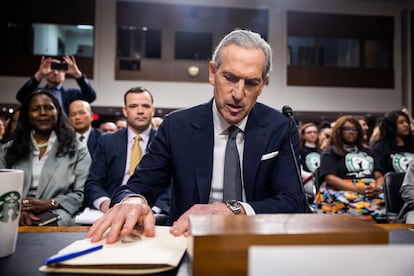Starbucks’ Howard Schultz defends union stance before Senate
Senator Bernie Sanders, a vocal supporter of Starbucks labor organizers, has sought Schultz’s testimony for months, saying he has violated workers’ rights by opposing unionization

Longtime Starbucks CEO Howard Schultz insisted his company hasn’t broken labor laws and is willing to bargain with unionized workers as he was questioned during an often testy, two-hour appearance before the Senate Health, Education, Labor and Pensions Committee. But he also was firm in his stance that the Seattle coffee giant already provides good wages and benefits and doesn’t need a union.
“We’ve done everything that we possibly can to respect the right under the law of our partners’ ability to join a union,” Schultz said. “But conversely, we have consistently laid out our preference, without breaking any law, of communicating to our people what we believe is our vision for the company.”
At least 293 of Starbucks’ 9,000 company-owned U.S. Starbucks stores have voted to unionize since late 2021, according to the National Labor Relations Board. Starbucks Workers United, the labor group seeking to unionize stores, has yet to reach a contract agreement with any Starbucks store.
U.S. Senator Bernie Sanders, a Vermont Independent who has been a vocal supporter of Starbucks labor organizers, accused the company of stalling. He said federal courts and administrative judges at the NLRB have found Starbucks guilty of hundreds of labor law violations, including firing labor organizers and illegally closing unionized stores.
“The fundamental issue we are confronting today is whether we have a system of justice that applies to all, or whether billionaires and large corporations can break the law with impunity,” Sanders said.
Schultz denied the company has broken the law and said Starbucks is appealing those charges. He said Starbucks respects workers’ right to unionize, but believes the company already provides its workers with industry-leading wages and benefits.
He noted that Starbucks’ average starting wage is $17.50, while the minimum wage in Vermont is $13.18.
“I think unions have served an important role in American business for many years. In the ‘50s and ‘60s, unions generally were working on behalf of people in a company where people haven’t been treated fairly,” Schultz said. “We do not believe that we are that kind of company. We do nothing nefarious. We put our people first.”
That comment earned a rebuke from Senator Mike Braun, an Indiana Republican, who said $17 per hour is not a living wage.
“Any large corporation shouldn’t necessarily be bragging about $15 to $20 wages,” Braun said.
But other Republicans defended Starbucks, saying it has created millions of jobs and is being demonized by Democrats to bolster their support from unions.
Senator Rand Paul, a Kentucky Republican, questioned why customers are willing to pay $6 for a Starbucks latte, and said his family is satisfied with Maxwell House. But Starbucks still deserves respect, he said.
“The hearing today is convened to attack a private company for its success,” Paul said.
Senator Tina Smith, a Minnesota Democrat, questioned Schultz’s respect for employees, noting that the company has refused to add new benefits __ like credit card tipping or wage increases __ at stores that have unionized. Schultz countered that those benefits are subject to bargaining.
Smith said labor organizers are seeking to address an imbalance of power within the company. Labor organizers have complained that Starbucks can cut their schedules with little notice, for example, making them ineligible for benefits.
“You’re a billionaire and they are your employees. The imbalance is extreme,” Smith said.
Schultz angrily responded that repeatedly calling him a “billionaire” was unfair.
“I grew up in federally subsidized housing. My parents never owned a home. Yes, I have billions of dollars. I earned it. No one gave it to me,” he said.
Sanders had sought Schultz’s testimony for months. Schultz had tried to sidestep the hearing, suggesting that others in the company were more deeply involved in labor matters.
But Sanders argues that Schultz, who stepped down as interim CEO last week but remains on the company’s board, was instrumental in setting the company’s policies.
Schultz repeatedly pointed out that just 3,400 of Starbucks’ 250,000 U.S. employees have elected to join a union.
“About 1% of partners have chosen a different approach, as is their right under law,” he said.
The unionization effort has been contentious. Earlier this month, a federal labor judge found that the company violated labor laws “hundreds of times” during a unionization campaign in Buffalo, New York. The company is appealing. Federal judges have also forced Starbucks to reinstate the labor organizers that it fired.
Schultz, who led Starbucks from 1987 to 2000 and from 2008 to 2017, returned as interim CEO last April. Starbucks’ new CEO, Lazman Narasimhan, told The Associated Press that he also believes Starbucks functions better without unions.
“I continue to believe a direct relationship with our partners is the best way forward,” Narasimhan said.
Sign up for our weekly newsletter to get more English-language news coverage from EL PAÍS USA Edition
Tu suscripción se está usando en otro dispositivo
¿Quieres añadir otro usuario a tu suscripción?
Si continúas leyendo en este dispositivo, no se podrá leer en el otro.
FlechaTu suscripción se está usando en otro dispositivo y solo puedes acceder a EL PAÍS desde un dispositivo a la vez.
Si quieres compartir tu cuenta, cambia tu suscripción a la modalidad Premium, así podrás añadir otro usuario. Cada uno accederá con su propia cuenta de email, lo que os permitirá personalizar vuestra experiencia en EL PAÍS.
¿Tienes una suscripción de empresa? Accede aquí para contratar más cuentas.
En el caso de no saber quién está usando tu cuenta, te recomendamos cambiar tu contraseña aquí.
Si decides continuar compartiendo tu cuenta, este mensaje se mostrará en tu dispositivo y en el de la otra persona que está usando tu cuenta de forma indefinida, afectando a tu experiencia de lectura. Puedes consultar aquí los términos y condiciones de la suscripción digital.








































